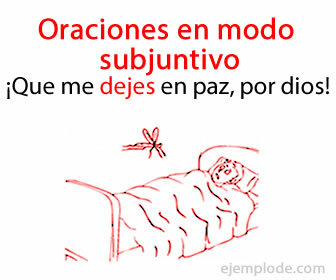Example of Conjugated Sentences in the Subjunctive Mood
Spanish Classes / / July 04, 2021
In the conjugated sentences in the subjunctive mood the action, intimately linked to its main content, is presented as a possible, probable, desired, hypothetical, believed, feared or necessary event. In this way, the subjunctive helps us to express uncertainties, subjectivities and possibilities. In the case of Spanish or Castilian, the most common uses of the subjunctive are to express a wish, a doubt, something possible or probable, express hypothetical actions, wishes, doubts or possibilities. In these sentences, the verbs change the direct expression of an action (I want) to a form that expresses the possibility or doubt (I would have wanted, I would, I wanted).
In Spanish there are forms of verb conjugation that use the subjunctive mood, with two forms for each of the tenses:
Present subjunctive: Refers to the actions that are present, but that are not yet finished, or that can be carried out in a near moment.
Simple: When the verb acquires the subjunctive form to express the desired action: Ame, viese, corres:
tell her advise arriving.
Maybe tomorrow I arrived early.
I call you nothing more sing.
Compound: As in all the compound forms of the subjunctive, the verb haber is used, plus the participle of the verb: have loved, have seen, have run:
It would be better than have warned.
It is rare that today has arrived early.
It is natural that at the party have sung.
Preterite subjunctive: Express actions or wishes that did not end in the past, or that began, but will end in the future.
Simple: The verb acquires the subjunctive form: amara, amase; see, see; ran, ran:
I told him warn arriving.
It was enough that reach.
They would have paid more attention if sing.
Compound: In this form of conjugation it is where the would exist, and it is one of the most used in Spanish. It is composed of the form "would" together with the participle of the verb: I would have loved, you would have seen, they would have run:
I would have warned when I arrive.
Yes would have arrived, we would have finished before.
I would be happy if would have sung.
Future subjunctive: In this case it speaks of actions that can be carried out or materialized in the future, or of things that could happen, but will not necessarily happen.
Simple: This form is widely used in legal language to indicate actions that can happen, and for which there is an action to follow if they happen. They are generally used in conditional sentences: amare, vieren, corrieren:
Yes I will notify your arrival will be better.
They will get the extra money if they will finish before eleven.
Who can enter sing in.
Compound: In the future, the verb to have is the one that takes the subjunctive form of the future, and is followed by the verb in participle. It is also used in conditional sentences: would have loved, would have seen, would have run:
The fact that would have warned you will get the pass first.
Those who they would have finished early, they will have to wait for the departure time.
After what they would have sungThey will have to wait for the jury's qualification.
There are other verb forms with which conjugated sentences are also formed in the subjunctive mood, in the that the context is the one that expresses the possibility, doubt or desire, as happens in conditional sentences:
- Who I would want be so far away?
- Y If I see a Martian?
- ¿you don't bring The condiments?

25 examples of conjugated sentences in the subjunctive mood:
- My teachers they would have wanted make him an excellent student.
- I do not think that it can solve the problem.
- Maybe find in his house.
- I do not think that have thrown Water.
- They would have no problem if they would have paid the rent.
- We wish you were have solved soon the conflict.
- I let you know if needed
- You will pay the corresponding tax when I will charge
- I was hoping that everything come out
- I hope not wasted food.
- It would calmer yes I would have studied before the test.
- Yes you will arrive earlier, you would reach for chocolate.
- The first that I will reach the goal will win.
- We would have bought another soda.
- I hope that they have made this before.
- Who would havefound a blue book, I was able to take it to my office.
- Do you think that have been seen the news?
- Who believe blindly is happy.
- Yes hadsaying what I thought, I they would have chased.
- Yes buy painkillers, no would have this toothache so strong.
- The team that I'll find the note, will be the winner.
- The team that would have found the golden egg, will have the second prize.
- The teams that find the silver butterfly, will share third place.
- Was best student if I don't know distract yourself
- If it came before you give me a chocolate?

